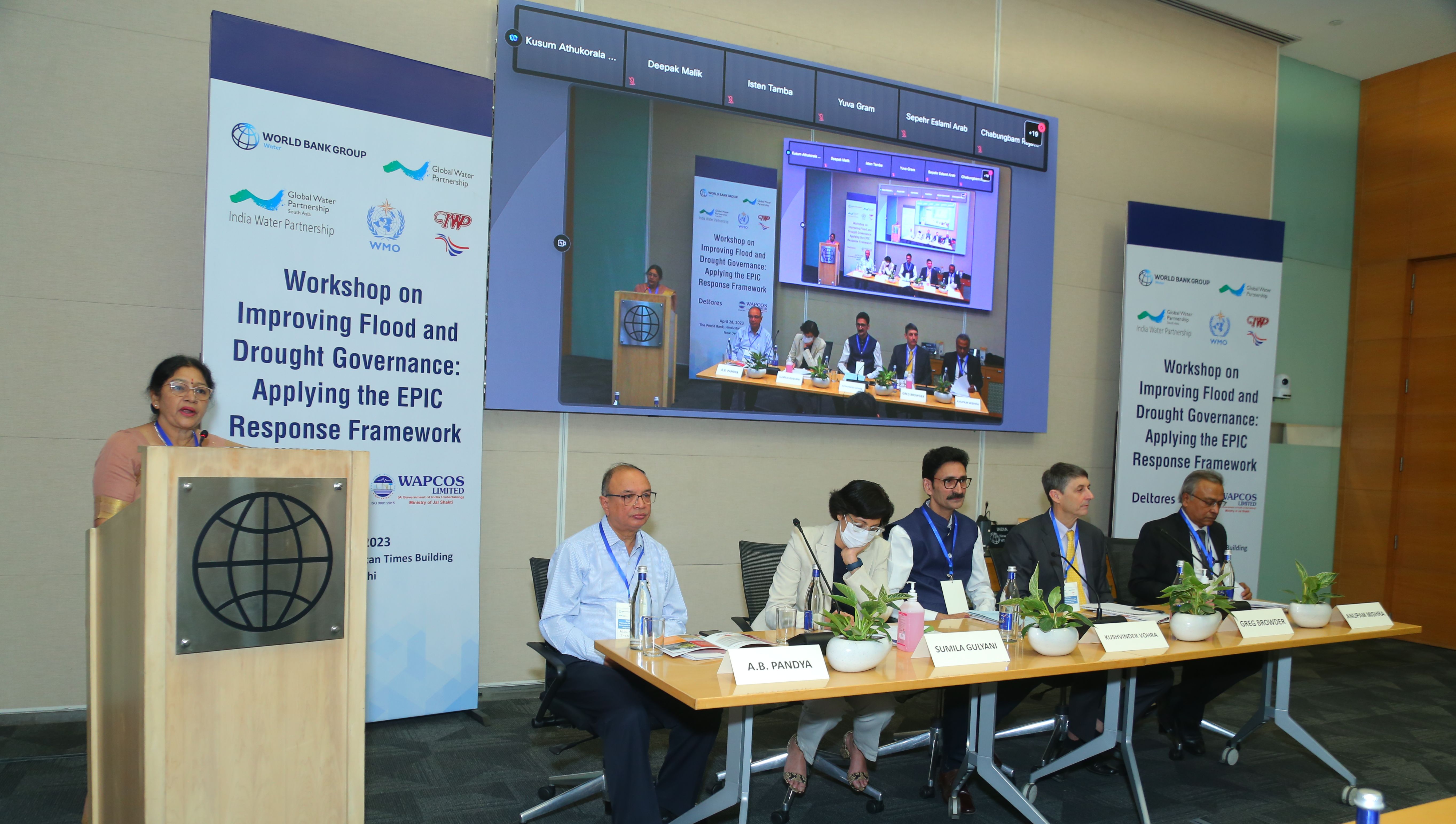Climate crisis-induced floods and droughts are increasingly affecting communities across the world. The toll on human suffering is two folds, both health-related and the costs on economies which makes it crucial for the respective governments to prioritise, accelerate, and scale up their response mechanisms. In contrast, the Nations could harness the power of water for their development and avoid human suffering, economic losses, and ecological degradation. The key is to understand the hydrological cycle and learn how to embrace the inevitability of floods and droughts, and the drastic alternations between them. It requires innovative governance and risk management approaches that navigate uncertainty, protect communities, economies, and ecosystems, reduces duplication, and improve the efficiency of using public resources.
A new perspective was introduced during the workshop named EPIC Response which offers better management of hydro-climatic risks. It considers floods and droughts as different ends of the same hydro-climatic spectrum that are inextricably linked. The EPIC Response Report was jointly prepared by the World Bank and Deltares (Netherlands) in collaboration with the GWP and the World Meteorological Organisation (WMO). It provides a systematic and comprehensive tool for identifying gaps, constraints, challenges, and opportunities for enhancing a government’s flood and drought risk management programmes. The tool has also been tested in Assam, India.
With this background, GWP India/India Water Partnership with the close collaboration of GWP, World Bank, WMO and Deltares (Netherlands) organised a workshop named “Improving Flood and Drought Governance: Applying the EPIC Response Framework” with the participation of the Ministries of Jal Shakti, Agriculture, Irrigation and State Departments of India, Researchers, Academia, Community Based Organisations and Private Sector representing mostly the South Asia region.
The objectives of the workshop are,
- To disseminate the World Bank’s flagship report on hydro-climatic risk management: “An EPIC Response: Innovative Governance for Flood and Drought Risk Management”
- Share the EPIC Response Assessment Methodology and its application (Piloted in Assam)
- To present the GWP/WMO’s Integrated Drought Management Programme (IDMP) and Associated Programme on Flood Management (APFM)
- Explore governance challenges and generate recommendations for improving flood and drought risk management at the national and State levels in India; and come up with recommendations for improving flood and drought governance.
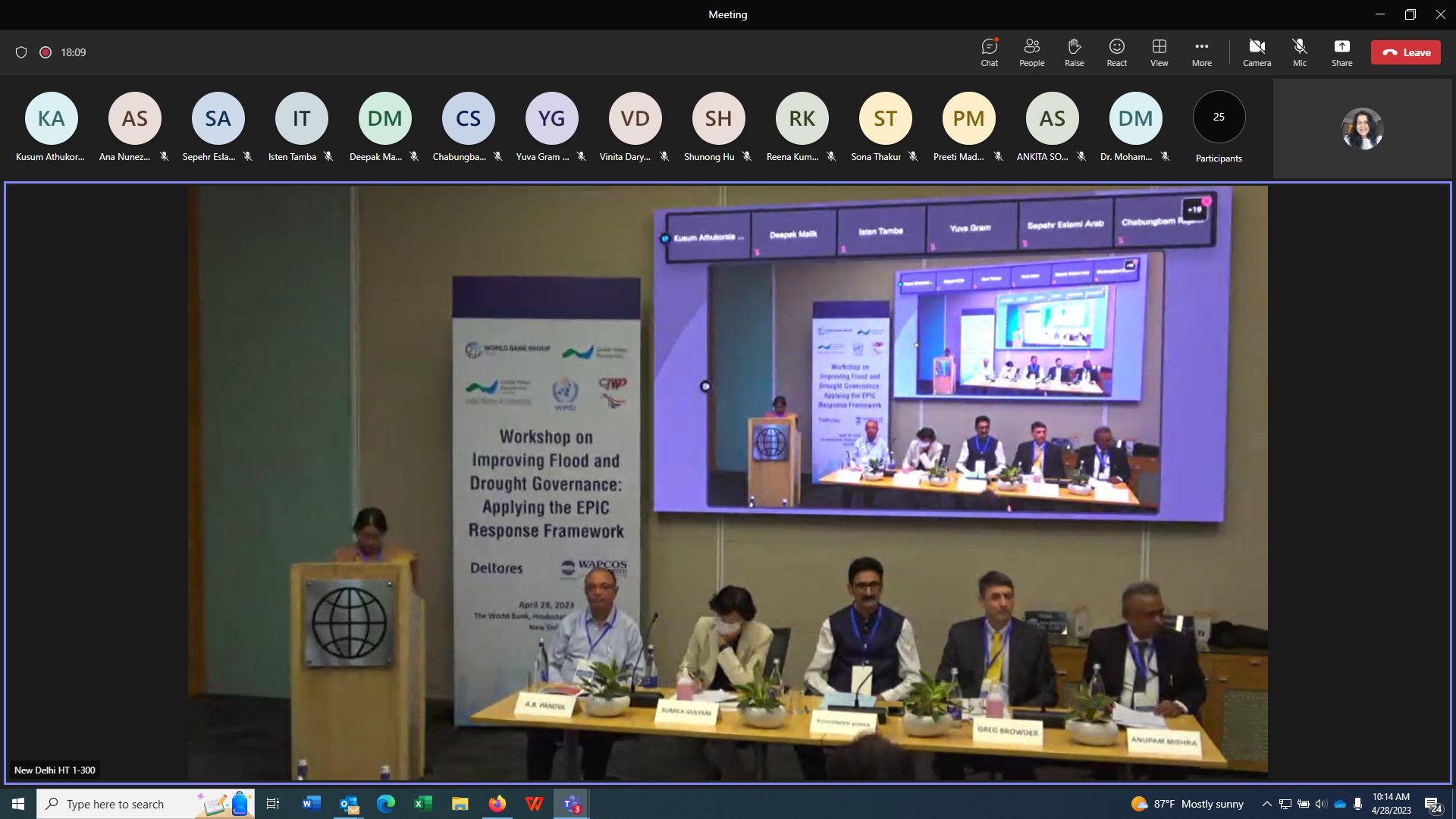 Veena Khanduri, Country Coordinator, GWP India was the master of ceremonies and gave the floor to Anupam Mishra, an Honorary Member of GWP India and Director, Commercial and HRD, WAPCOS Limited for opening remarks who expressed the importance of flood and droughts to be managed using the EPIC Response framework. Sumila Gulyani, South Asia Water Practice Manager, World Bank, New Delhi welcomed the audience and informed them that the World Bank as a knowledge bank in India runs nearly USD 20 billion worth of projects.
Veena Khanduri, Country Coordinator, GWP India was the master of ceremonies and gave the floor to Anupam Mishra, an Honorary Member of GWP India and Director, Commercial and HRD, WAPCOS Limited for opening remarks who expressed the importance of flood and droughts to be managed using the EPIC Response framework. Sumila Gulyani, South Asia Water Practice Manager, World Bank, New Delhi welcomed the audience and informed them that the World Bank as a knowledge bank in India runs nearly USD 20 billion worth of projects. 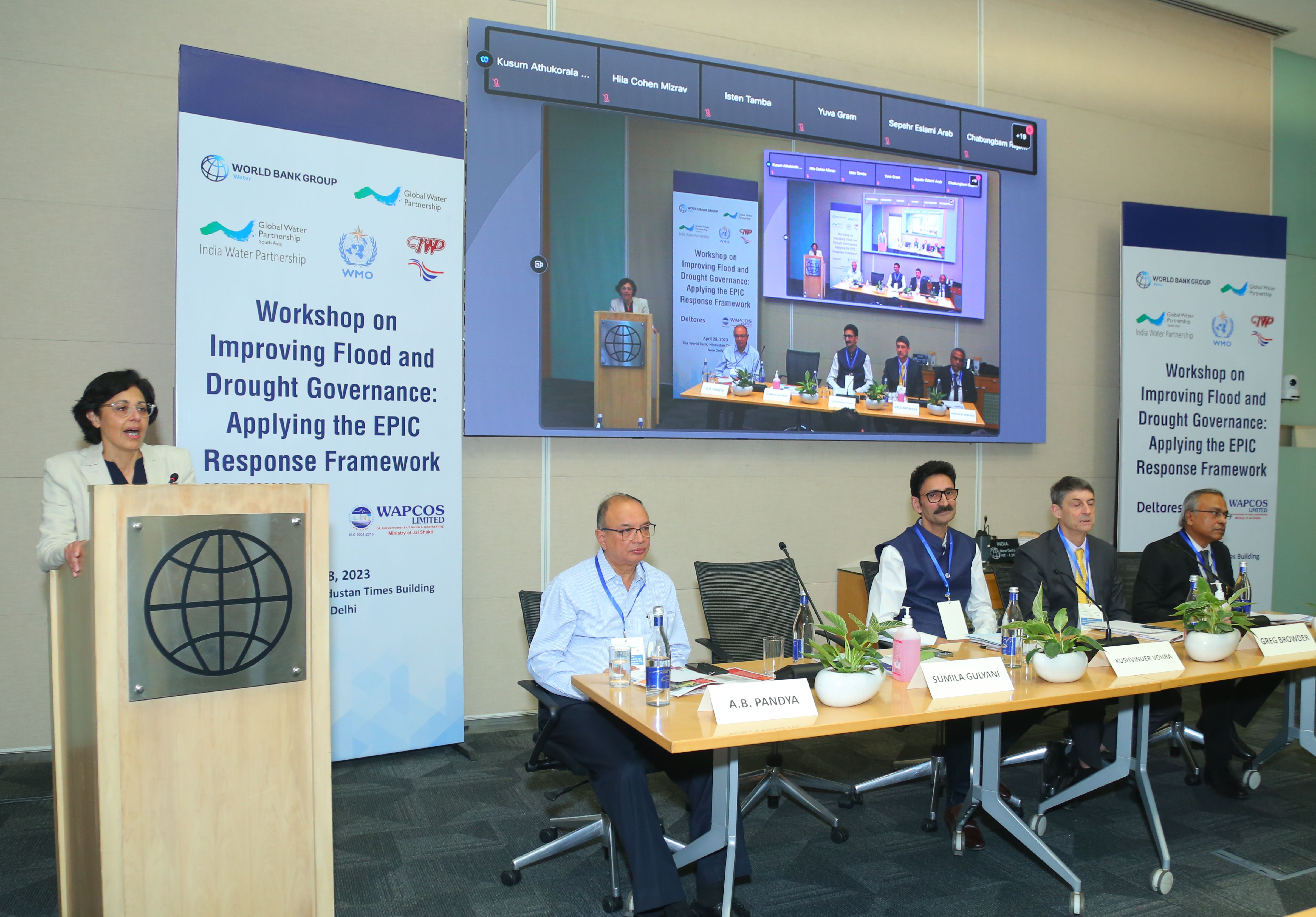 She further expressed that “the increasing frequency and intensity of floods and droughts demand a multi-sectoral approach but an approach which is challenging”. She gave two examples from Assam, India and downstream of Brahmaputra in Bangladesh. After the context-setting speech made by A. B. Pandya, Regional Council Member, GWP SAS and Secretary General, International Commission on Irrigation and Drainage (ICID), New Delhi, K. Vohra, Chairman, Central Water Commission, Ministry of Jal Shakti, Government of India made the keynote speech. He expressed that “although India’s flood and drought forecast is accurate up to 95 per cent the challenge is to develop a comprehensive plan to minimise the profound effect of drought on the country’s economy. The plan should include solutions from various sectors such as agriculture, irrigation, meteorology, environment, and the public. The multi-stakeholder approach is one of the biggest barriers for the nation”.
She further expressed that “the increasing frequency and intensity of floods and droughts demand a multi-sectoral approach but an approach which is challenging”. She gave two examples from Assam, India and downstream of Brahmaputra in Bangladesh. After the context-setting speech made by A. B. Pandya, Regional Council Member, GWP SAS and Secretary General, International Commission on Irrigation and Drainage (ICID), New Delhi, K. Vohra, Chairman, Central Water Commission, Ministry of Jal Shakti, Government of India made the keynote speech. He expressed that “although India’s flood and drought forecast is accurate up to 95 per cent the challenge is to develop a comprehensive plan to minimise the profound effect of drought on the country’s economy. The plan should include solutions from various sectors such as agriculture, irrigation, meteorology, environment, and the public. The multi-stakeholder approach is one of the biggest barriers for the nation”.
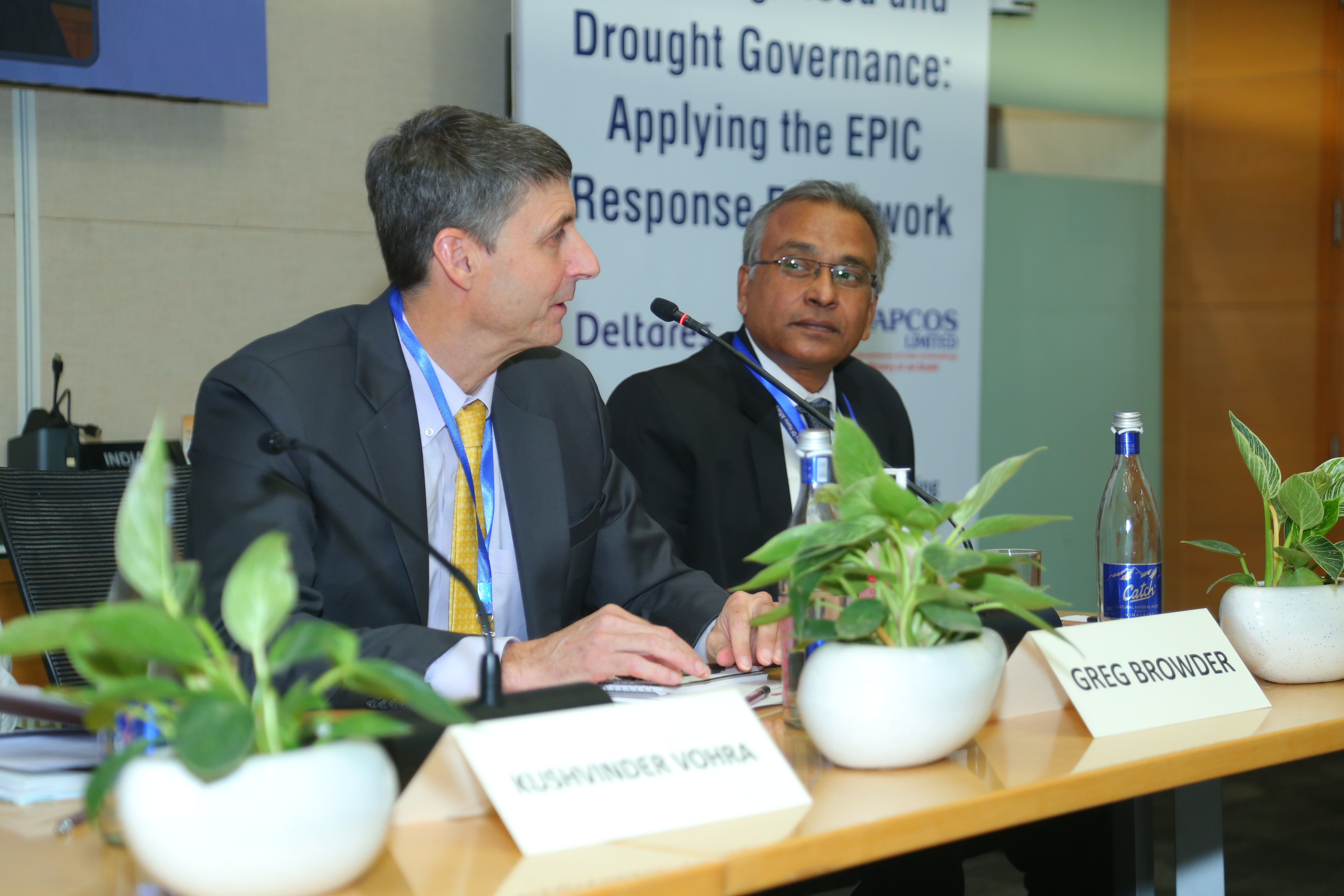 Greg Browder, Lead Water Resources Management Specialist from World Bank presented the EPIC Response Framework. He said that “the days of financing flood and drought risk separately are over. The EPIC Response framework addresses floods and drought within a unified hydro-climatic risk management”. He further explained that floods and drought are on either side of the same spectrum and need to be managed within the same governance system. Ana Nunez Sanchez, Expert Advisor, Resilience and Planning Department, Deltares, The Netherlands presented the EPIC Response Assessment Methodology (ERAM Tool). She also presented the innovative application of EPIC Response in the state of Assam in 2023, and projections of future expectations beyond the project.
Greg Browder, Lead Water Resources Management Specialist from World Bank presented the EPIC Response Framework. He said that “the days of financing flood and drought risk separately are over. The EPIC Response framework addresses floods and drought within a unified hydro-climatic risk management”. He further explained that floods and drought are on either side of the same spectrum and need to be managed within the same governance system. Ana Nunez Sanchez, Expert Advisor, Resilience and Planning Department, Deltares, The Netherlands presented the EPIC Response Assessment Methodology (ERAM Tool). She also presented the innovative application of EPIC Response in the state of Assam in 2023, and projections of future expectations beyond the project.
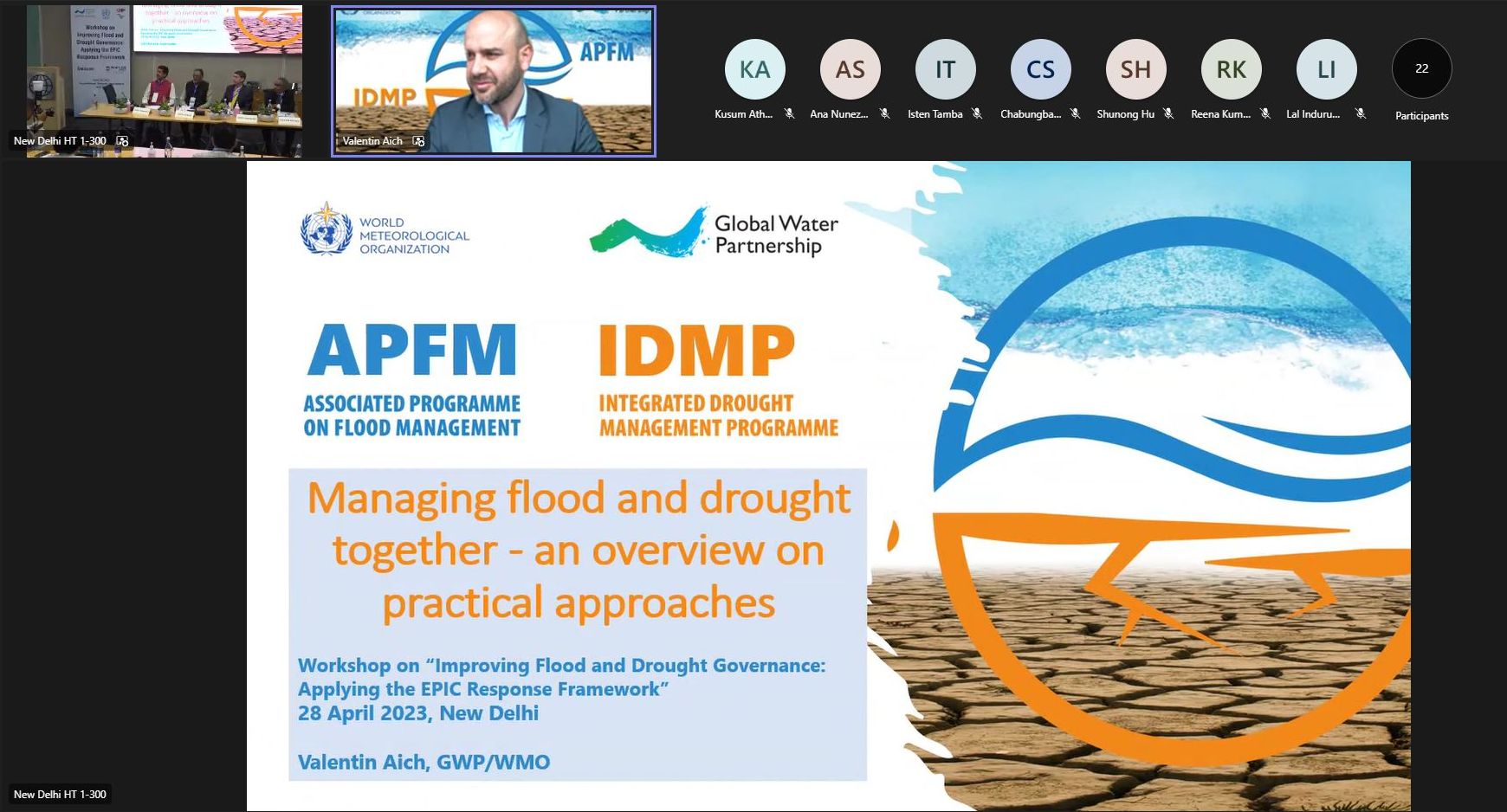 Valentin Aich, Senior Water and Climate Specialist from GWP presented on the WMO/GWP Integrated Drought Management Programme (IDMP) and the publications and tools of the Associated Programme on Flood Management (APFM). Experience sharing on Integrated Drought and Flood Risk Management based on States perspective was conducted by Giriraj Amarnath, Research Group Leader – Water Risk to Development and Resilience and Principal Researcher, International Water Management Institute (IWMI), Sri Lanka. There were two sessions on national and state perspectives on governance challenges on flood and drought management in India followed by a panel discussion on applying the EPIC framework to improve flood and drought governance in India.
Valentin Aich, Senior Water and Climate Specialist from GWP presented on the WMO/GWP Integrated Drought Management Programme (IDMP) and the publications and tools of the Associated Programme on Flood Management (APFM). Experience sharing on Integrated Drought and Flood Risk Management based on States perspective was conducted by Giriraj Amarnath, Research Group Leader – Water Risk to Development and Resilience and Principal Researcher, International Water Management Institute (IWMI), Sri Lanka. There were two sessions on national and state perspectives on governance challenges on flood and drought management in India followed by a panel discussion on applying the EPIC framework to improve flood and drought governance in India.
The eminent panelists highlighted various aspects of flood and drought management in India focusing mainly on scientific, technological, administrative, legislative, policy, and institutional dimensions. The panel delved deep into the question of the relevance of the EPIC Response approach for India. It concluded that the EPIC Response framework would be highly useful in the Indian context for improving the management of hydro-climatological hazards. The panel also underlined the need for policy and institutional reforms to create a proper governance ecosystem that will enable such innovative approaches to disaster risk management to be operationalised effectively. This will need integration of the framework with the sustainable development goals. Moreover, at the state and local level, environmental and social characteristics and community participation will be the crucial factors to be considered for the successful implementation of such a governance assessment tool.
The closing remarks were conducted by Greg Browder, Lead Water Resources Management Specialist, World Bank, USA.
